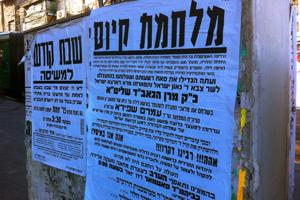Israel’s Ultra-Orthodox Jews Debate Mainstream Involvement
A street sign in an Ultra-Orthodox section of Jerusalem accuses the “evil” Israeli government of trying to wipe out the Ultra-Orthodox community once and for all. (photo: Matthew Bell)
Israel is going through a volatile clash of values that sets the Ultra-Orthodox community against mainstream secular and religious society.
The Haredim — as Israelis refer to the Ultra-Orthodox — only make up about 10 percent of the population. But it is one of the fastest-growing segments of society, due in large part to high birth rates.
There are a whole host of issues at stake, from military service to work force participation to gender segregation in public places.
The Jerusalem neighborhood of Mea Shearim is an Ultra-Orthodox stronghold. It’s a place where the Israeli police tend to keep a low profile. An example of why came on Sunday.
As uniformed police officers moved into the neighborhood to arrest several suspects on tax evasion charges, dozens of men dressed in the traditional Ultra-Orthodox style — long black coats, big beards and black hats — confronted the officers in the street. Scuffles broke out when Haredi tried to block traffic to protest the arrests.
Down the street, Shmuel Yisrael runs a sewing machine repair shop. Yisrael is an observant Jew himself. But he resents the way the Haredim live in isolation from the mainstream.
“It’s not good,” Yisrael said. “They don’t pay taxes, they don’t serve in the army and they don’t contribute.”
It all goes back to a deal made by Israel’s first prime minister, David Ben-Gurion. The Ultra-Orthodox were given exemptions from military service and generous government subsidies so they could spend long hours in prayer and religious study.
This arrangement has endured. And it’s a win-win, said a 28-year-old Haredi man waiting at a bus stop. He gave his name as Yehuda and said he studied in a yeshiva nearby.
“The way we feel is that, when we learn and we study Torah all day, that’s a big merit for the survival of the Jews,” he said. “We feel that as long as there are people fighting in the army and there are people learning, they compliment each other.”
As Yehuda sees it, the Haredim are being pressured by the media, by the government and by secular Israelis to make an unacceptable compromise.
“We will not give up on our standards of living a life of Torah,” he said.
“We’re religious and we’re completely committed to that. We’re not going to give up on those standards just because other people think we shouldn’t be religious.”
Around the corner from the bus stop, there was a much more extreme view from one segment of the Haredi community on display. It was a wall poster with names of several rabbis on it that accused the “evil government” of anti-Semitism. It said the authorities are trying to “destroy Haredi Judaism” by conducting a “brutal campaign of arrests” that harken back to the “darkest days of the Soviet Union.”
The poster is an example of what is wrong in the Ultra-Orthodox community, according to 52-year-old Yehuda Meshi-Zahav. He is a former Haredi extremist himself.
In the 1970s and 80s, Meshi-Zahav organized demonstrations against the Israeli authorities. He was an ardent anti-Zionist who rejected the idea of compromising with the Israeli government or making connections to the non-Haredi world.
But since the early 1990s, Meshi-Zahav has been very much engaged with the mainstream. He runs a highly-regarded volunteer organization of emergency medical responders called ZAKA. Many of the volunteers come from the Haredi community.
“Most of the Ultra-Orthodox community is completely sane,” Meshi-Zahav said in an interview at his Jerusalem office. “These people recognize that Israel is made up of different sectors that all belong here. But there are still extremists. They have too much influence on the community.”
Meshi-Zahav said the leaders of the Haredi community need to speak out against Ultra-Orthodox extremism. There have been incidents such as throwing rocks at police, spitting on school girls for not dressing modestly, or attacking businesses for not being religiously observant enough. Meshi-Zahav said these are the kinds of actions that more Haredi leaders need to denounce publicly.
In general, Meshi-Zahav and others like him want to lower the walls that divide the Haredim from the outside world. They want more people from the Ultra-Orthodox community to enter the work force, to serve in army, and, more broadly, serve the nation of Israel.
But for some Ultra-Orthodox Jews, these views amount to heresy.
Yoelish Krauss is a 39-year-old Haredi activist. He lives in a two-room apartment in the Mea Shearim neighborhood with his wife and their 13 children. Krauss used to run a chicken slaughterhouse in the area until the Israeli police shut it down, accusing him of tax evasion and refusing inspections.
Krauss said he was not surprised to hear Meshi-Zahav’s call for the Haredim to build more connections with mainstream Israeli society. “He runs an international organization,” Krause said. “Of course he would say such things.”
“If you ask me,” Krauss said, “the Haredim need to be more isolated from the rest of society. That’s how we can preserve our way of life.”
Krauss said engaging with the non-Haredi world is a slippery slope. And it would lead to one thing: the Ultra-Orthodox would inevitably become secular. “There’s no way around it,” he said.
We want to hear your feedback so we can keep improving our website, theworld.org. Please fill out this quick survey and let us know your thoughts (your answers will be anonymous). Thanks for your time!
